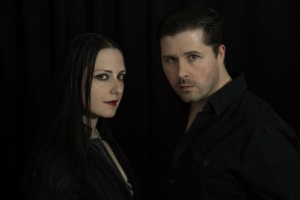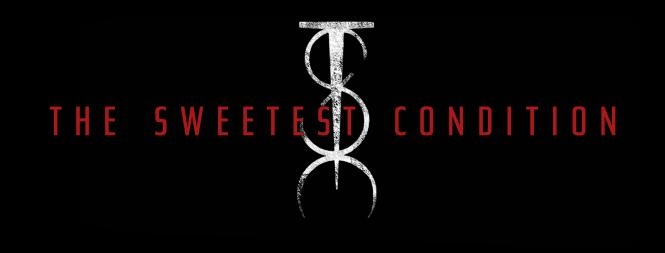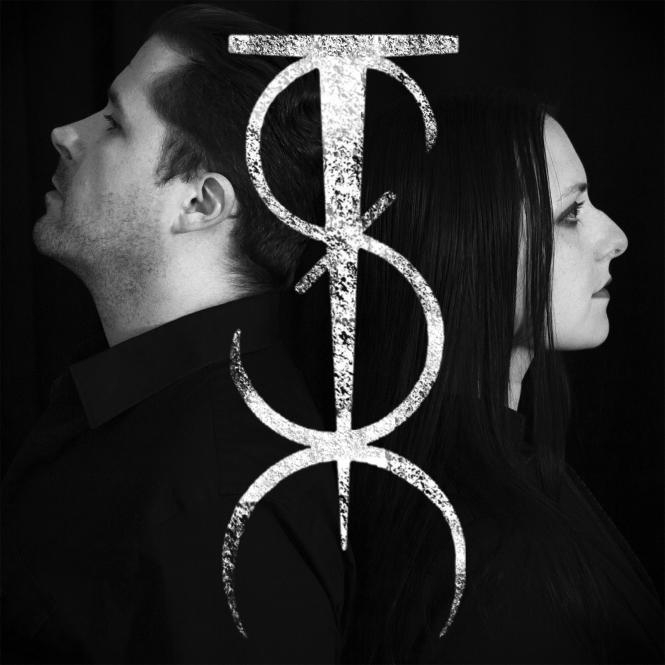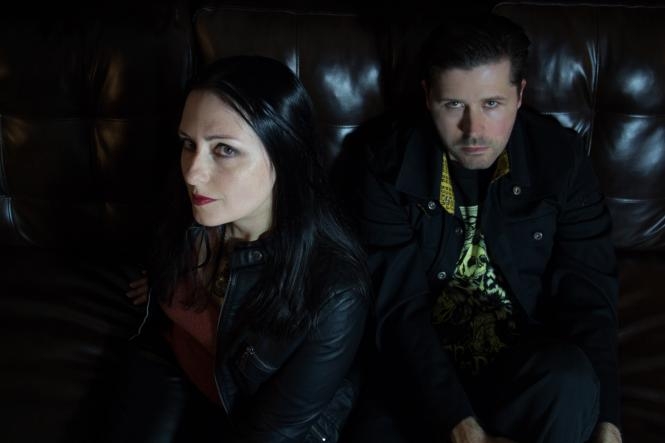
With their latest album We Defy Oblivion scoring a whopping 9.5 out of 10 here on Brutal Resonance, you could say The Sweetest Condition is bound to land on some folks' album of the year lists. With that in mind, we chatted with the duo behind the music Leslie and Jason and got the entire rundown on their new album. Read on below!

Hey guys! Thanks for joining us on Brutal Resonance! I already obviously know of your existence and the like, but let’s catch up the fans that don’t. What is The Sweetest Condition, who’s in it, and what are your favorite brands of alcohol?
Leslie Irene Benson: The Sweetest Condition is a female-fronted, industrial synthpop band based in Nashville, Tennessee. Named in honor of Depeche Mode, The Sweetest Condition represents the juxtaposition between the dark and the light. It’s the innocence of your first love—that churning, all-consuming infatuation. Flip the coin, and it’s obsession, addiction—the toxic codependent tug-of-war learned from feeling worthy and worthless. Some joy, some pain.
As a band, it’s Jason Reed Milner (music + synths + guitars) and myself. I write all the lyrics and vocal melodies. Wet met ten years ago on the goth-industrial club circuit and launched The Sweetest Condition from the ashes of our first music collaboration, Irene & Reed. In 2013, we moved from Indianapolis, Indiana, to Nashville where we teamed up with our sound engineer, Joel Lauver of Burning Bridge Recordings to produce our debut, Edge of the World. In November of this year, we worked together again and released our second full-length album, We Defy Oblivion.
As artists, we love local craft beers and red wine. But living in the South has really given us an appreciation for whiskey. We drink Woodford Reserve (Kentucky bourbon-whiskey blend), Jameson Irish Whiskey and Whisper Creek Tennessee Sipping Cream (charcoal-mellowed Tennessee whiskey and cream). Damn, now I need a drink!”
Your debut EP Truth and Light was a five-tracker that got a little bit of press coverage. How did this EP help lay the foundation for The Sweetest Condition? What did you learn after putting out this material?
Leslie: Our first song written for the new project was ‘Watch You Fall,’ an experiment in aggressive electro-industrial songwriting that ignited The Sweetest Condition as a band. (It would later appear on the Edge of the World release). Truth & Light helped us come full circle with our dark electronic roots.
Lyrically, much of the EP was a personal goodbye letter to my high school sweetheart, who committed suicide. It was also a goodbye to Indy. I had written a poem called ‘The Ghost & The Girl,’ which also became our first music video. The stripped-down, spiritual track holds nothing back, describing the nightmare—and the art—of letting go. A confessional theme continues throughout the EP.
In the music, Jason’s early Nine Inch Nails influence is evident on the EP, a style that would evolve on our later albums. Vocally, I channeled David Gahan of Depeche Mode to capture the mood I wanted to portray, especially on the deeply soulful highlight of the Truth & Light EP, 'The Wound.'
Jason: With the EP, we were testing the waters to see what direction we wanted to go. I loved what we did with it, but it made me want to push the envelope and go a little bit further. With the latest album, I think we’ve pushed ourselves even more. I’m excited to start writing the next one!
It would be about two years after that your full-length debut Edge of the World would take many, many critics by storm. I’ve seen a ton of coverage for this album and haven’t seen a single negative blip about it. How do you think you improved from Truth and Light going into Edge of the World?
How did you take in all the positive coverage from Edge of the World? Did it surprise you how well critics and fans took to the album?
Shooting to a later period, your first single 'Knock Us Down' off your second full-length album, We Defy Oblivion, was released in August. What is the song about? And why did you choose this song to introduce fans to the new album?
'Knock Us Down' was also released side-by-side with a music video. Who created the music video? And why did you choose such stark images to go hand-in-hand with the song?

And now that we’re up to your next album We Defy Oblivion. The album has its roots with darker industrial mechanics and the like. How did you achieve this sound? Did you draw inspiration from other bands for this album?
Jason: With this album, I wanted to have a rich, thick, unmistakable industrial feel. I wanted the sounds to have weight to them. I drew inspiration from older Nine Inch Nails albums, Ministry and Die Krupps. Something noticeably different on this album is that we used more heavy guitar sounds, because the songs called for it.
Both personal subjects (love, loss, sin, salvation, etc.) and political (chaotic state of the world) themes are being explored on the album. How did you tie these two issues together?
Out of all the tracks on the album, which one are your favorites and why? Do you have a bond with one song for any reason in particular?
Jason: At the moment, I think my favorite is ‘Don’t Cross Me.’ I had a lot of fun creating the synth line and harmonic guitars used for that song. Leslie’s lyrics brought it to life in a way that I couldn’t imagine.

Would you rank We Defy Oblivion better or worse than Edge of the World? Or can you not draw comparisons in that manner?
And will you be touring at all in support of this new album? Do you have any gigs in the making?
Jason: Absolutely! We have nothing lined up right now but hope to start booking soon!
Lastly, I’d like to thank you for your time and wish you the best of luck with We Defy Oblivion. I leave the space below open for you to say anything more you wish. Cheers!
Leslie: Thank you to everyone for your undying support. We are forever grateful.

Steven Gullotta
info@brutalresonance.comI've been writing for Brutal Resonance since November of 2012 and now serve as the editor-in-chief. I love the dark electronic underground and usually have too much to listen to at once but I love it. I am also an editor at Aggressive Deprivation, a digital/physical magazine since March of 2016. I support the scene as much as I can from my humble laptop.
Share this interview
Facebook
Twitter
Google+
Shares
Popular interviews
Psyclon Nine
Interview, Mar 24 2017
Night Runner
Interview, Oct 13 2016
Testube
Interview, Apr 02 2022
Kite
Interview, Feb 10 2017
God Destruction
Interview, May 17 2016
Related articles
The Sweetest Condition - 'We Defy Oblivion'
Review, Nov 01 2016
Aberrant Behavior - 'Disorder'
Review, Jul 13 2017
Kite - 'V'
Review, May 06 2013
Project Two - 'Electrix'
Review, Sep 11 2012
!distain - 'On/Off'
Review, Mar 12 2012



